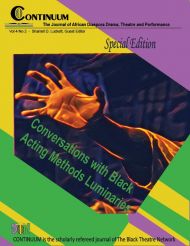Native Guard by Natasha Trethewey
Freda Scott Giles
Adapted for the stage by Susan V. Booth
September 26-October 19, 2014
The Alliance Theatre, Atlanta Georgia
Set Design: Anne Patterson
Costume Design: Leslie Taylor
Lighting Design: Ken Yunker
Sound Design: Clay Benning
Media Design: Adam Larsen
Composer/Music Director: Tyrone Jackson
Vocalist: Nicole Banks Long
Cast:
Native Guard: Thomas Neal Antwon Ghant
The Poet: January Lavoy
The persistence of memory: memory connects us to our individual pasts, but also connects us to the macro-history that contextualizes that past. Natasha Trethewey, author of the Pulitzer Prize-winning volume of poetry, was born on Confederate Memorial Day in 1976, exactly a hundred years after the holiday was established. Native Guard leads us through her own Mississippi childhood as the daughter of a white father and African American mother who married when interracial marriage was illegal in the state, to the Civil War history she was taught in school that led her to investigate the actual history of the Native Guard, the first African American Union Troop in the Civil War, many of whom died under horrific circumstances near Vicksburg. When Susan V. Booth, Artistic Director of the Alliance Theatre, encountered Trethewey’s book, she found “poetry with the urgency of action.” She approached Trethewey with the idea of performing the poems and set to work building a memorable and moving theatrical event.
Booth places the entire work onstage: all of the poems, including the epigraphs —brief quotations from other poets and notables and snatches of song lyrics that introduce sections—and individual poems. She turned the snatches of songs into fully sung accentuations of atmosphere and emotion. What is especially impressive is the way the audience is invited to connect on a very personal level to the performance. When the house is opened, most of the audience has assembled in the lobby, and each has received a blank brown luggage tag with a safety pin and has been asked to write a memory of a person who should be remembered or a story that should be told. Near the lobby is a photographic exhibit of the Civil War era entitled “Things That Should Be Remembered” that has helped the audience grasp what the evening will be about. As we entered the house, we saw these memories pinned from floor to ceiling on a burlap drop that surrounded the entire house. Later, we would be invited to pin our memories on the drop. The stadium-style seating was composed of an eclectic assortment of chairs that did not match, cushioned benches and cushions on the floor for those who would/could use them. The semi-thrust playing area was a landscape with a floor of sand broken up by strategically placed stones and a very small pond stage right. At intermission we would leave our footprints in the sand as we pinned our memories to the drop. A bench was placed upstage center and across the front of the playing area. A wooden walkway that flowed from a raised area stage right down and across the floor helped to demarcate the formal playing area; later we would discover that Native Guard had been among us in the audience and would enter the playing area from there. The singer and pianist were placed in the upper level of the house right seating area. They performed a variety of spirituals, blues and jazz songs (including taking requests) as the audience waited for the performance to begin. The environment was completed by the use of projections of photographs and images that complemented the poems.
The performance began with a video projection of Trethewey stating, “The best way to listen to poetry is with your whole body.” The Poet (LaVoy) then took us through the first half of Native Guard. Each poem revealed more and more of Trethewey’s traumatic past: not only the expected idea that growing up as a mixed-race child in Mississippi was difficult, but also the story of the dissolution of her parents’ marriage and the shocking death of her mother at the hands of her abusive stepfather. Memories of childhood—an ice storm, a train trip, a field of Narcissus flowers are sifted though in search in an attempt to come to terms with the life and death of a primal love: “. . . the Erebus I keep you in, still trying/not to let go. You’ll be dead again tomorrow, but in dreams you live . . .”
The second half of the book and the performance belongs to Native Guard (Ghant). His cycle of poems was spurred by a school field trip Trethewey took to Vicksbug, steeped in its Confedrate past: “In my dream, the ghost of history lies down beside me, rolls over, pins me beneath a heavy arm.” Here, she runs across the story of the Native Guard, volunteers from Louisiana who ended up being knowingly fired upon by Union troops, and left un-retrieved to rot on the battlefield.
But rather than being sad, the evening was uplifting. Confronting memories can be painful but it is also enriching and layered with joy as well as pain. The audience was invited to stay after the performance to discuss their relationships with the history of Atlanta and we told each other stories—some sad, some humorous, that, along with a wonderful evening of theatre, turned a collection of strangers into a living archive, a rich trove of America’s history.
--Freda Scott Giles



